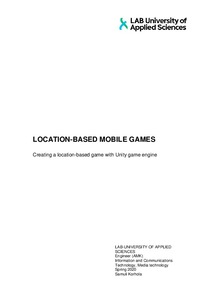Navigating Challenges in Indie Game Development: A Study of the Nordic-Baltic Region
Rodriguez, Irislis (2025)
Rodriguez, Irislis
2025
Julkaisun pysyvä osoite on
https://urn.fi/URN:NBN:fi:amk-2025051311191
https://urn.fi/URN:NBN:fi:amk-2025051311191
Tiivistelmä
The market size of the videogame industry by 2023 was estimated to be 166.9 billion euros with about 3,381 million players worldwide. Particularly in the Nordic and Baltic regions, the videogame industry has emerged as a dynamic and growing sector of the economy. In Europe the industry is mostly com-posed of about 4,600 small and micro-organizations providing employment to almost 100,000 people. Indie game developers are small teams or single individuals dedicated to videogame development without having financial or structural support from a publisher or group of external investors which in some cases might hinder their opportunities of success.
This thesis, commissioned by Kajaani University of Applied Sciences (KAMK), acting as the coordinating institution for the Nordic/Baltic Network for Game Development (NoBaN) explores the state of the indie game development ecosystems within the region by mapping the challenges that indie develop-ers face and how the existing public policies, academic contributions, and industrial connections can influence sustainable growth. The study draws on a review of literature, policy documents, and indus-try reports, combined with a qualitative, multiple-case study approach based on twelve in-depth in-terviews with developers from Finland, Norway, Estonia, and Latvia. Despite the local differences across the four countries, the main challenges identified are the limited support mechanisms that min-imize financial resources impeding full time dedication for the projects, limited business and manage-rial skills, lack of specialized incubators and accelerators, difficulty finding co-founders and lack of recognition of the industry.
A series of recommendations and areas of focus are presented, that includes the elaboration of a comprehensive guide of financial resources available for indie developers, strengthening and develop-ing sponsorship opportunities, improving and expanding the communication channels beyond Aca-demia, developing specialized incubators and accelerator programs and establishing programs of legal support to assist developers with contractual and legal matters. Additionally, it advocates for the for-mal recognition of the producer role in indie teams and calls for a more refined societal and institu-tional perception of videogames as both cultural artifacts and viable business ventures.
This thesis, commissioned by Kajaani University of Applied Sciences (KAMK), acting as the coordinating institution for the Nordic/Baltic Network for Game Development (NoBaN) explores the state of the indie game development ecosystems within the region by mapping the challenges that indie develop-ers face and how the existing public policies, academic contributions, and industrial connections can influence sustainable growth. The study draws on a review of literature, policy documents, and indus-try reports, combined with a qualitative, multiple-case study approach based on twelve in-depth in-terviews with developers from Finland, Norway, Estonia, and Latvia. Despite the local differences across the four countries, the main challenges identified are the limited support mechanisms that min-imize financial resources impeding full time dedication for the projects, limited business and manage-rial skills, lack of specialized incubators and accelerators, difficulty finding co-founders and lack of recognition of the industry.
A series of recommendations and areas of focus are presented, that includes the elaboration of a comprehensive guide of financial resources available for indie developers, strengthening and develop-ing sponsorship opportunities, improving and expanding the communication channels beyond Aca-demia, developing specialized incubators and accelerator programs and establishing programs of legal support to assist developers with contractual and legal matters. Additionally, it advocates for the for-mal recognition of the producer role in indie teams and calls for a more refined societal and institu-tional perception of videogames as both cultural artifacts and viable business ventures.
Kokoelmat
Samankaltainen aineisto
Näytetään aineisto, joilla on samankaltaisia nimekkeitä, tekijöitä tai asiasanoja.
-
Game Development in Unity : Game Production, Game Mechanics and the Effects of Gaming
Dansie, Jason (Metropolia Ammattikorkeakoulu, 2013)The goal of this thesis is to examine how video games are designed and to see how differ-ent game mechanics work and how to use them in the development of a game, as well as examine what are both the positive and negative ... -
Location-based mobile games : creating a location-based game with the Unity game engine
Korhola, Samuli (2020)The subject of this thesis is location-based mobile games. Location-based mobile games are a way for mobile games to combine reality with virtual worlds and thus re-define the gaming experience. This thesis presents ... -
”WE WANT A 3D GAME” : Customer expectations for the games company when buying a serious game
Sorppanen, Mikko (Oulun seudun ammattikorkeakoulu, 2012)All digital games are not used for entertainment. Some of them can also be used for non-entertainment purposes and these games are called serious games. This thesis is carried out in co-operation with one Finnish games ...



